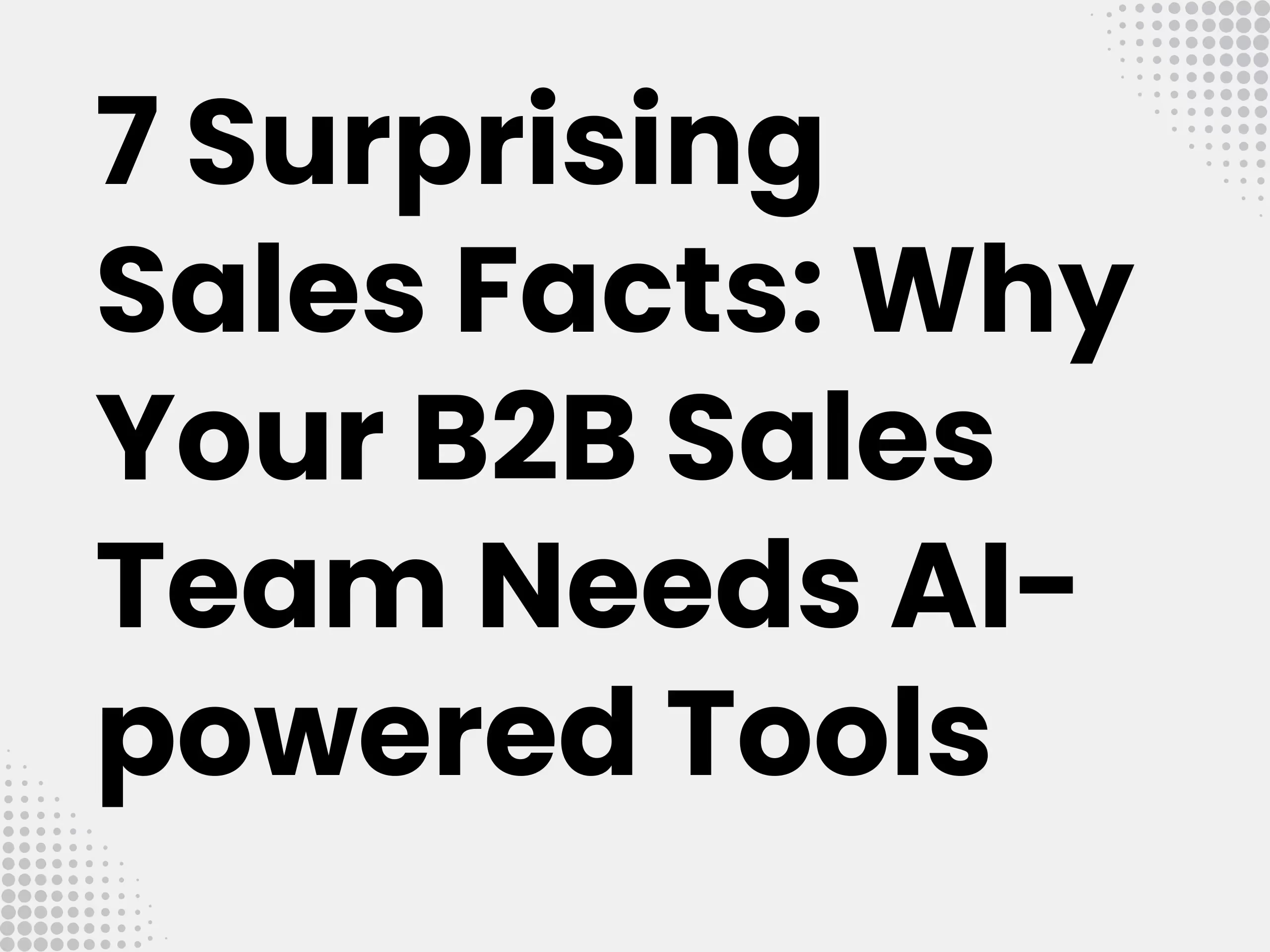Introduction: The Sales World Is Changing: Fast
Sales is no longer about just charisma and closing skills. It's about data, precision, and meeting buyers where they are, especially in virtual settings. Yet, many sales teams still rely on outdated tools or processes. In this blog post, we dive into 7 surprising facts about modern sales that expose key challenges and inefficiencies and explain how modern tools help solve them.
1. Sales Reps Spend Only 28% of Their Time Selling
As a company, you naturally want your sales team focused on what they do best: selling. Yet, according to Salesforce’s State of Sales report, sales reps spend only 28% of their time engaging with prospects. The majority of their workweek is consumed by administrative tasks: updating CRMs, drafting follow-ups, and preparing reports. This results in a substantial loss of selling time and momentum.
To regain that lost productivity, organizations are increasingly turning to intelligent tools that automate meeting documentation, CRM entries, and follow-up workflows. When these processes run in the background - seamlessly integrated into daily routines - salespeople can focus fully on building relationships and closing deals, not data entry.
2. 80% of Sales Require 5+ Follow-Ups, But Most Reps Stop After 1
It’s no secret that sales success often hinges on persistence, rarely does a deal close after the first touchpoint. Yet, even a well-executed cold call can be met with a curt “not interested.” Research shows that 80% of sales require at least five follow-ups to reach a successful close, but more than 40% of sales representatives give up after just one attempt. Without a reliable system to track buyer objections, decision-makers, expressed needs, and next steps, promising opportunities slip through the cracks far too early in the process.
To counter this, sales teams need tools that automatically capture and organize key insights from every conversation, enabling them to build targeted, timely follow-ups that align with the buyer’s journey. Structured data from sales calls isn’t just a productivity booster - it’s a competitive advantage.

3. The Average Buyer Forgets 90% of What Was Said in a Sales Call
Cognitive science research shows that people forget up to 90% of what they hear within just seven days and this effect is even more pronounced during complex B2B discussions. Even the most compelling pitch risks being forgotten if it’s not reinforced afterward.
That’s why it’s crucial for sales teams to have a system in place that can capture, summarize, and distill key conversation points into clear, personalized recaps. When follow-ups highlight buyer-specific needs, pain points, and value propositions, they don’t just jog the buyer’s memory, they keep the deal moving forward with precision and clarity.

4. Bad CRM Data Costs Companies 15–25% of Revenue
According to Gartner, poor-quality data - including outdated, incomplete, or missing CRM notes - can cost organizations as much as 25% of their annual revenue. When crucial details from sales conversations are entered manually, it often results in inconsistencies, forgotten context, and human error. Especially across large teams, the difference between the quality and structure of notes can lead to misunderstandings.
To mitigate this, more teams are relying on automated systems that accurately capture and structure key information from every sales call, ensuring CRMs remain a trustworthy source of truth. With consistent and up-to-date records, reps can focus on selling, and companies can make smarter decisions based on clean, reliable and structured dat
5. Sales Training Is Worth It - But Only If It Sticks
Salesforce Training reports that sales training can boost individual rep performance by an average of 20%. But the real challenge isn’t just delivering the training, it’s making sure those new skills are actually used in day-to-day sales conversations.
Without reinforcement, much of what reps learn is quickly forgotten or poorly applied. That’s why many teams now rely on smart tools that give managers visibility into real sales interactions. These tools help track whether reps are using the techniques they’ve been taught.
When coaching and feedback are based on real conversation data, training becomes something that sticks and continues to drive performance long after the workshop ends.

6. Sales Managers Struggle to Coach - Because They Lack Visibility
According to CSO Insights, just 30% of sales managers feel confident in their ability to coach effectively. The main challenge? A lack of visibility into what’s actually happening during sales conversations.
Without a clear window into how reps handle objections, deliver value, or respond to buyer questions, coaching becomes reactive or based on guesswork. That’s why forward-thinking teams are adopting conversation intelligence tools that automatically highlight key coaching moments, surface common objections, and pinpoint opportunities for improvement - making coaching more data-driven, consistent, and impactful.
7. AI-Driven Sales Teams Generate Over 50% More Leads
Artificial Intelligence (AI) is reshaping how modern sales teams operate and the results are undeniable. According to McKinsey, organizations using AI in their sales processes report a 50% increase in leads and appointments, along with 40–60% lower costs and significantly shorter call durations.
AI tools can analyze vast amounts of customer data to identify high-intent leads, suggest optimal follow-up timing, and even predict deal success. But here’s the catch: AI is only as powerful as the data it receives.
That’s why leading sales teams are investing in systems that automatically capture, structure, and enrich conversation data from objection handling to stakeholder names and buying signals. Without this layer of structured insight, AI tools can’t reach their full potential.
Conclusion: Turn Sales Challenges into Opportunities with the Right Tools
These seven surprising facts make one thing clear: modern sales teams face challenges that charisma and grit alone can’t solve. From wasted selling time and forgotten follow-ups to poor CRM hygiene, underutilized training, and missed coaching moments - the obstacles are real, and they’re costing companies serious revenue.
But they also highlight a massive opportunity. With the right tools in place, sales teams can automate the repetitive, reinforce the strategic, and unlock performance at every level - from the first outreach to the final close.
That’s where tools like Bliro come in. Bliro is a conversation intelligence and productivity platform designed for modern sales teams. It automatically captures, structures, and syncs critical insights from every in-person and virtual meeting, without bots, screen recordings, or disruption. Whether you're looking to save hours of admin work, improve sales training, or feed clean data into your AI stack, Bliro empowers your team to sell smarter, faster, and more effectively.
In today’s fast-moving, data-driven sales landscape, the real question isn’t whether you can afford a tool like Bliro - it’s whether you can afford not to use one.




